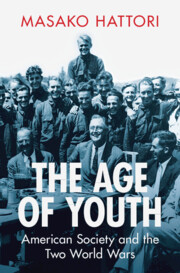
-
Select format
-
- Publisher:
- Cambridge University Press
- Publication date:
- May 2025
- April 2025
- ISBN:
- 9781009303323
- 9781009303361
- Dimensions:
- (229 x 152 mm)
- Weight & Pages:
- 0.52kg, 243 Pages
- Dimensions:
- Weight & Pages:
You may already have access via personal or institutional login
Book description
The Age of Youth tackles the complicated relationship between youth, national security, and education from World War I to World War II. It reveals how the United States created a time-specific political and social category of youth that relied on the expectation that military-age men should devote themselves to the future of their country. Analyzing policies from the Reserve Officers' Training Corps, the New Deal, wartime military training programs, and those governing the post-World War II occupation of Japan, Masako Hattori demonstrates that the priorities of national security conditioned young people's access to education in the US in the first half of the twentieth century, in both wartime and peacetime, and explores how the evolving link between youth, education, and national security shaped and reshaped the cultural concept of “youth” in American society.
Reviews
‘Masako Hattori blends the histories of youth, education, and national security to tell a bigger story about the varied and profound impacts of world wars on American society. She even takes us to postwar Japan, offering a fascinating and original comparative of how young people on opposing sides of the war experienced its end. Most of all, this study invites us to ponder anew an uncomfortable but resilient belief in American culture: that war abroad can foster social reform at home.'
Laura McEnaney - author of Postwar: Waging Peace in Chicago
‘Masako Hattori offers an original and provocative socio-political look at the rise of a national security state during the long World War I era. She convincingly upends assumptions about youth and education by redefining them in the context of national security concerns. A brilliant look at diplomacy and its domestic roots.'
Tom Zeiler - University of Colorado Boulder
Contents
Metrics
Full text views
Full text views help Loading metrics...
Loading metrics...
* Views captured on Cambridge Core between #date#. This data will be updated every 24 hours.
Usage data cannot currently be displayed.
Accessibility standard: Unknown
Why this information is here
This section outlines the accessibility features of this content - including support for screen readers, full keyboard navigation and high-contrast display options. This may not be relevant for you.
Accessibility Information
Accessibility compliance for the PDF of this book is currently unknown and may be updated in the future.

